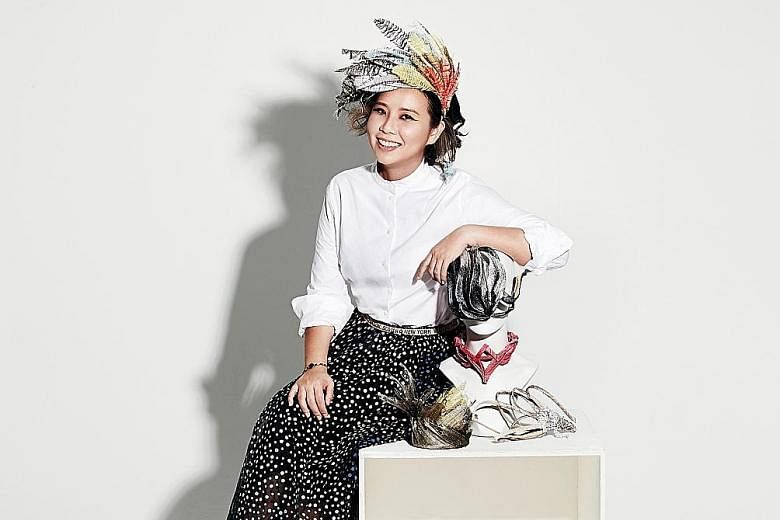Milliners typically use steamers that run on electricity to loosen fibres, making them malleable enough to shape into hats.
But all home-grown hatter Chee Sau Fen, 42, needs is the warmth of her hands.
Most of the entrepreneur's hats, under her Heads of State Millinery label, are made from abaca fibre, peeled by hand from the upper trunk of the abaca tree - a relative of the banana plant - native to the Philippines.
The fibres are collected and handwoven on traditional looms by women from the Daraghuyan community of the Bukidnon tribe in southern Philippines.
This creates a lightweight, breathable material, which is then crafted into hats using needle and thread.
The sewing is done by 10 to 14 housewives in Cebu, as well as by Ms Chee and two assistants here.
Says Ms Chee, whose hat-making skills are self-taught: "You don't need steam. The heat from our hands is enough to soften the fabric, allowing us to shape it.
"The women in Cebu don't have easy access to electricity, so I planned it such that everything can be done by hand or with rudimentary tools such as looms."
She chanced upon the abaca fibre during a 2012 work trip to Cebu, after experimenting with various re-usable materials for more than six months.
"The local craftswomen used it to make clothes and bags. But I thought, it can also be used to make hats. That it could create employment opportunities for marginalised communities was also a plus."
The dyes used for colouring are extracted by the craftswomen from natural objects such as flowers and plants.
No stiffening chemical sprays are involved.
Ms Chee says: "Anyway, I don't think such processes are suitable to make hats worn in this part of the world because it is hot and humid here."
The sociology and linguistics graduate from the National University of Singapore used to be an arts manager, working at museums.
In 2011, she won Singapore's first sustainable fashion competition - organised by the Workforce Development Agency and the Textile and Fashion Federation to groom budding designers - despite having no formal training in design.
She entered dresses made from recycled nylon stockings woven on canvas mesh.
She says: "Back then, I just wanted to discover more ways to re-use waste materials. At art events, I often saw a lot of waste when the event wrapped up."
Her business might be green, but the hats are colourful and beautiful.
Many are inspired by natural objects, such as jellyfish and stingrays. She also uses materials such as Japanese washi paper.
Her ready-to-wear hats are priced between $158 and $358, and are sold at multi-label store The Emporium at Tanglin Mall.
Some of her customers - from all ages and walks of life - ask for customised hats, which start from $500.
Some even fly here from Australia and India to order the hats.
While she declines to provide sales figures, she says she is making just as much as she used to as an arts manager.
"Some lifestyle brands have approached me to design special headgear for their events or campaigns and it feels good to be able to bring eco-friendly fashion into the mainstream."
Benson Ang


